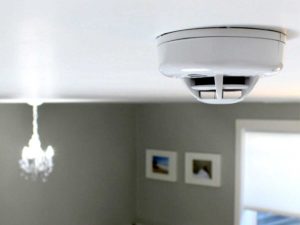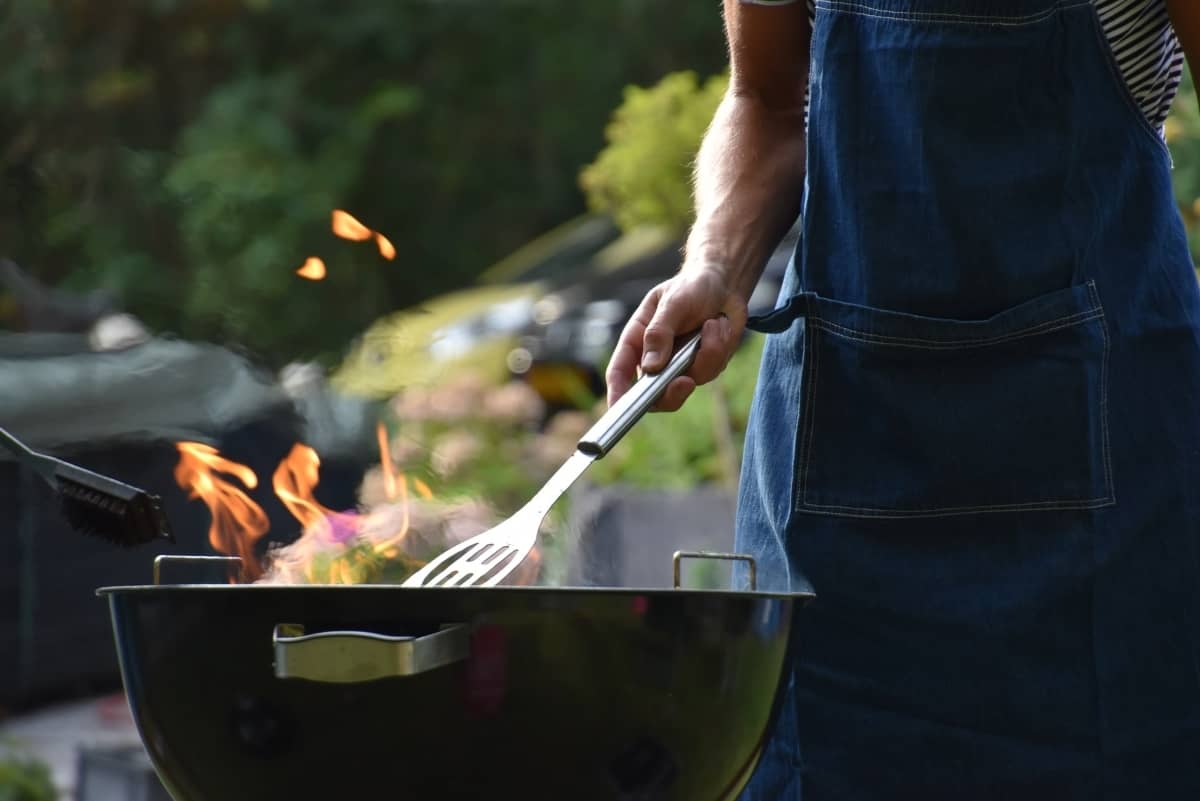According to the National Fire Protection Association (NFPA), the fire department responds to over 350,000 U.S. house fires a year. In fact, a fire department responded to a fire every 24 seconds on average in the United States in 2019. These flames can cause significant damage, injury, and even death. Follow these safety tips to protect you, your home, and your family from house fires.
Make Sure Your Home Has Working Smoke Detectors
Smoke detectors are one of the best defenses you have for house fires. That’s because, when a fire breaks out in your house, it will spread quickly. A smoke alarm will give you the warning you need so that you and your family can escape to safety.
To make sure your smoke detectors are as effective as possible, the NFPA recommends following these fire safety tips:
- There should be at least one smoke detector on each level of your home, including the basement. Also remember to install smoke detectors inside and directly outside each bedroom of your house. Larger homes may require additional smoke alarms.
- Make sure that all the smoke detectors in your house are interconnected. That way when one sounds, they all sound.
- Test your smoke alarms at least once a month and replace them when they are 10 years old.
- Smoke alarms should be installed on the ceiling or on your wall.
- Smoke alarms should be installed at least 10 feet from the stove.
- If you or a member of your household are deaf or hard of hearing, you will need to install special fire alarms that use strobe lights or send vibration signals.
How long do smoke smoke detectors last? Read our guide to learn when it’s time for a replacement.
Create an Escape Plan
When the smoke alarms go off in your home, the natural reaction is to panic, especially if it occurs while you are asleep. To help ensure you and your family can quickly get to safety, you must discuss an escape plan. As part of this escape plan, Ready.gov recommends that you:
- Create a plan for children or individuals who cannot escape on their own. As part of your planning process, discuss who will wake and help evacuate younger children in babies. There should be a backup just in case smoke overcame the designated individual. Or in case someone isn’t at home when a fire occurs.
- Determine two ways to get out of every room. This will ensure you know what to do should a room or path become blocked during a house fire. To help everyone plan these routes, it may help to draw a floor plan for each level of the house.
- Practice the escape routes. While it may be scary, practicing how to escape from a potential house fire is important, especially for children. As part of this practice, make sure that everyone in the house understands how they should move through the house, including getting low to the ground. This will help you avoid some of the smoke.
- Select a meeting space that is a safe distance from your home. This will ensure everyone knows where they come back together. Make sure your children know not to go back inside the building.

Practice Fire Safety in the Kitchen
Over 172,000 house fires each year originate in the kitchen. According to NFPA, a majority of these fires happen between the Thanksgiving and Christmas holidays and handle more than $1 billion in property damage.
To reduce the chances of fires in your kitchen, take the following precautions:
- Never leave your cooking — including frying, grilling, boiling, or broiling food — unattended.
- Remove any materials that can catch fire, including food packaging and oven mitts from the stovetop area.
- Keep a fire extinguisher in the kitchen in a place that is easily accessible. Make sure you know how to operate it properly.
- Be sure you’re not wearing loose-fitting clothing that can easily make contact with a flame or heat when cooking.
- Be sure you know how to dispose of hot grease. Avoid throwing it in the garbage while it’s hot. Instead, give it time to cool before you dispose of the liquid.
What To Do If a Fire Breaks Out
If a fire breaks out in your kitchen, it is important to act quickly, but safely. Follow these fire safety tips:
- If a grease fire breaks out, for example, you will need to smother it by sliding a lid over the pan. Next, quickly turn off the stovetop. Then leave the pan covered until it has completely cooled.
- If a fire breaks out in your microwave or oven, turn off the power or source of heat immediately. Keep the doors closed until the fire is out.
- No matter what, it is most important to keep your safety in front of mind. If you cannot safely contain the fire or reach your fire extinguisher, your priority should be to get outside and call 9-1-1 for help.
Practice Safe Grilling
Fires don’t just happen in the kitchen. They can also spark while you are grilling outside. To ensure your next BBQ doesn’t end in disaster, follow these fire safety tips:
- Keep your grill at least 10 feet from your home. This will help to ensure that if the grill sparks a fire, it doesn’t spread to your house as well.
- Clean your grill regularly. A dirty grill can easily catch fire.
- Keep any combustible items away from the grill. This is especially important when you are hosting a party and balloons, hanging baskets and other decorations may touch or fall into the grill and start a fire.
- Have a fire extinguisher close by. This will allow you to respond quickly to a fire that may start if you know how to use it. If you don’t know how to use it, you should call emergency services to put out the fire.
- Never leave the grill unattended. That way, if a fire starts, you can react before it spreads.
- Watch how much food you are adding to the grill. If too much food is on the grill at once, especially fatty foods that drip onto the flames, a fire can start.
Keep Your Electronics Safe
We don’t often consider our electronics as a source for flames, but they are. Unfortunately, electronics can start a fire if precautions are not taken. You can keep these devices from starting a fire by being mindful of their potential dangers. To prevent electrical fires:
- Make sure you are not running cords under carpeting, bedding, or other combustible materials.
- Stop using and get rid of any frayed or spliced wires.
- Don’t overload outlets or extension cords.
Additional Home Fire Safety Tips
In addition to these fire safety tips, it is also important to keep the following in mind to ensure that you do not start a house fire:
- Always keep items that can catch on fire, including blankets, clothing, and trash, at least three feet from anything that gets hot. This includes space heaters, radiators, and fireplaces.
- Turn off all space heaters or portable heaters when you are not in the room or when you go to sleep.
- Never smoke in bed.
- Candles cause 2% of all house fires. Make sure you only burn candles in well-ventilated rooms or on stable surfaces. Blow the candles out when you are not at the house or when you go to bed.
- Teach your children never to play with fire, matches, or lighters. This is a common way to spark a house fire accidentally.
- If you have a wood-burning fireplace, make sure you are only using dry, seasoned wood to get your fire going.
- During the holiday season, make sure that you are taking precautions with your live Christmas tree. These can be very flammable. Water it regularly, so it doesn’t become dry and brittle. Never leave the tree’s lights plugged in while you are sleeping away from the house.
- Clean your dryer lint screen out after each use — this is a common source for many house fires.

Make Sure Your Home is Monitored
Another way you can ensure your home stays safe from fire, especially when you are out of town or simply out for the evening, is to make sure it is monitored 24 hours a day by ONIT’s home security service. Our state-of-the-art equipment and a team of trained security experts will ensure that you and your family can get the help when you need it. Visit us online to learn more about how we can build a package that fits your budget. Or call us at 1-833-433-0331 to learn how ONIT Home customers can enjoy a $500 voucher to make their switch to a smart home security even easier.



